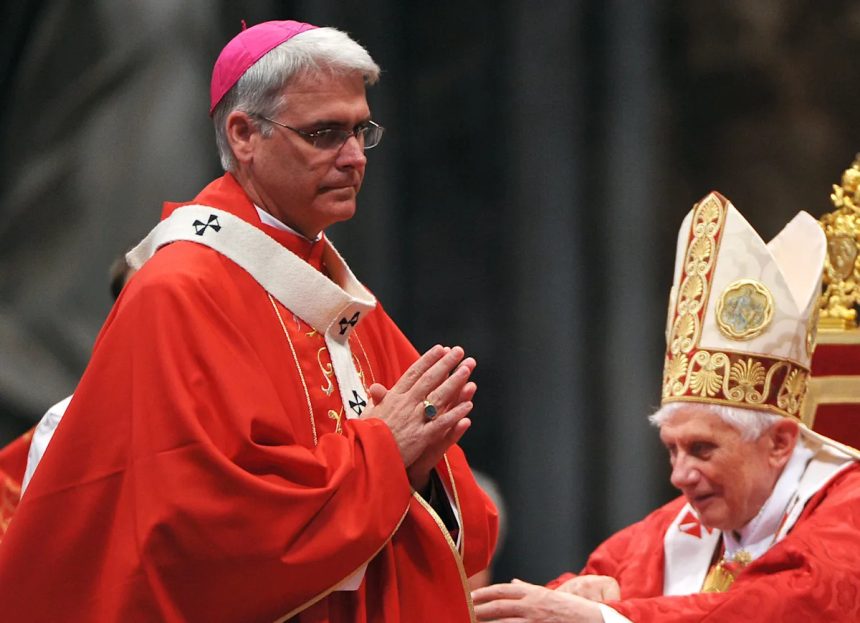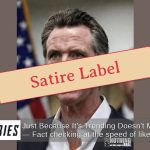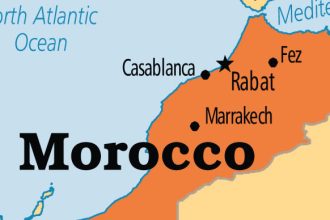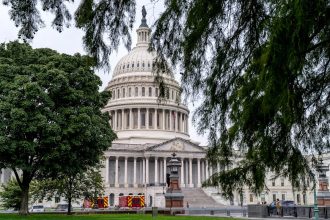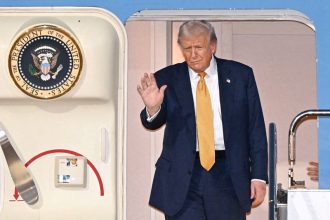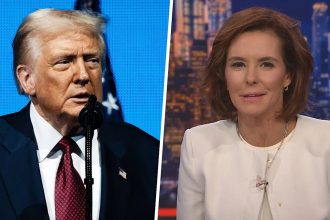Catholic insiders know about the conservatism of Oklahoma City Archbishop Paul Coakley, who was elected president of the United States Conference of Catholic Bishops this week. Michael Sean Winters, a columnist for National Catholic Reporter, called the election of Coakley “deeply disappointing.” I agree. The election of Coakley is yet another sign that the American Catholic Church has decided to keep on its rightward political move, in the service of what Winters terms “accommodation.”
Coakley, who replaces Archbishop Timothy Broglio as president of the USCCB, is not the change candidate needed to mount a full-throated response to the Trump administration’s mass-deportation goals. While Coakley has been vocal about immigration issues, he said on the day of his election that it’s better to “cast more heat than light.” He spoke after his election of the need to figure out “how to work with our administration to advance the interests of the church” on immigration policies. He represents the desire of most of the conference to take a consistent, middle-of-the-road approach to immigration issues.
But as disappointing as the election of Coakley is, there are yet signs that the UCCSB appreciates the awfulness of what Immigration and Customs Enforcement and the Department of Homeland Security are doing on our streets. Bishop Daniel Flores of Brownsville, Texas, only lost the USCCB presidency by a few votes, which means that the vocal advocate for immigrants and their plight will be the vice president of the conference. That he was a close second to Coakley is proof that there are bishops who hope their conference is louder in its support of immigrants. You can count on Flores to be vocal, and you can count on him to do more than just write statements. He has — and likely will continue — to stand with immigrants and support them.
Coakley, a particularly staunch pro-lifer, serves as adviser to the Napa Institute, the mission of which, in its own words, is to “empower Catholic leaders to renew the church and transform the culture.” Theologian Massimo Faggioli wrote this year that the “Napa Institute is one of those places where the new American political-religious order is taking shape” and that “the voices of the bishops there hold a particular authority.”
Coakley’s authority was compromised, though, when he expressed support for Archbishop Carlo Maria Viganò, the former apostolic nuncio to the U.S. Viganò invited Kim Davis, the Kentucky clerk who refused to sign same-sex marriage certificates, to meet Pope Francis in 2015, which resulted in Francis replacing him as nuncio. Viganò was excommunicated from the Catholic Church in 2024 for the offense of schism and public acts of defiance against the pope.
In 2018, Viganò had, as Commonweal reported at the time, made “sweeping charges against U.S. and Vatican church officials, including Pope Francis,” for mishandling claims that former Archbishop Theodore McCarrick had sexually abused minors and adults, and he called on Francis to “set a good example” and resign the papacy. Responding to the news of Viganò’s 11-page testimony, Coakley wrote a letter to the Archdiocese of Oklahoma City, saying, “While I lack any personal knowledge or experience of the details contained in his ‘testimony,’ I have the deepest respect for Archbishop Viganò and his personal integrity.”
Francis said he did not know about McCarrick’s abuse, and he defrocked McCarrick in 2019. A Vatican investigation the pope launched found many in the Catholic Church’s hierarchy had downplayed the abuse but did not name Francis as one of them.
Speaking to OSV News after his election, Coakely said of Viganò, “The harm that was done through that scandal has been deep and mistrust that followed is real.” Coakley said he “didn’t know Archbishop (Carlo Maria) Viganò other than what I knew of him from walking these halls here at bishops’ meetings. …. And I just didn’t want to jump to conclusions before all of the information was available.”
Regarding Viganò, Coakley said he didn’t know “what his views were, when I made those comments, which have been thrown back in my face numerous times subsequently and used against me,” but he agreed with the reporter interviewing him that the claims against him were warranted.
In addition to Flores’ election, a Special Pastoral Message on Immigration, approved on the second day of the bishops’ conference, is an indication that the bishops are pulling together to echo Pope Leo XIV on the issue of immigration. The statement said, in part:
“We are disturbed when we see among our people a climate of fear and anxiety around questions of profiling and immigration enforcement. We are saddened by the state of contemporary debate and the vilification of immigrants. We are concerned about the conditions in detention centers and the lack of access to pastoral care. We lament that some immigrants in the United States have arbitrarily lost their legal status. We are troubled by threats against the sanctity of houses of worship and the special nature of hospitals and schools.”
That message will be given to each parish across the U.S. by local bishops.
Pope Leo XIV in the Sistine Chapel on May 9, 2025. (Simone Risoluti / Vatican Media and Vatican Pool via Getty Images)
The document, which a group of bishops worked on, was strengthened with language suggested by Cardinal Blase Cupich of Chicago: “We oppose the indiscriminate mass deportation of people.”
While this simple sentence should be clear from Catholic Church doctrine, it took Cupich to remind the conference of the need to speak with plain moral clarity. That sentence — “We oppose the indiscriminate mass deportation of people” — should be the talking point of every Catholic clergyperson in the United States.
Will Coakley, who doesn’t want “heat” with the White House, be the one to communicate that message as ICE continues to chase down people on our streets to deport them? Given his desire to bring “light” to the situation, one can only hope. But until then, the pews of many parishes in the United States will remain emptier as Catholic immigrants hide in their homes because ICE has made them too afraid to come out and worship.
This article was originally published on MSNBC.com


